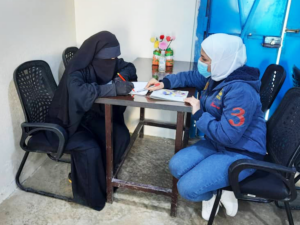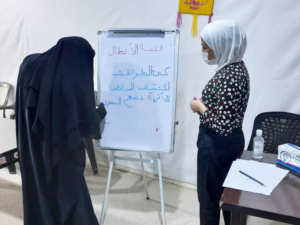At a new library in a northeast Syria displacement camp, residents of all ages can attend reading, writing, and other educational courses led by Blumont-trained coaches through the Conflict and Stabilization Program.
Access to education is a right that many displaced people have lost out on. This includes Zahia, a 40-year-old woman from Ar-Raqqa who was forced to flee with her family after their home was destroyed in the conflict.
“My biggest defeat in life was being deprived of the pleasure of reading and writing,” said Zahia. “I was often criticized by people in my community for being illiterate.”

Zahia, left, a displaced woman living in a camp in northeast Syria, learned to read and write at the camp’s library.
One day while shopping at the camp market, she overheard women discussing the library sessions. Despite the fear of being judged for her illiteracy, Zahia decided to visit the library. When she arrived, she found a safe learning environment where she could begin learning to read and write with help from the instructors and other participants. Since that first session, Zahia has been a regular participant in library activities.
The literacy instructors worked closely with Zahia, creating a tailored educational program for her—from teaching the Arabic alphabet to showing her to hold a pen correctly. Zahia continued practicing until she was able to read and write full sentences on her own.
The library sessions built Zahia’s literacy skills and self-confidence.

Zahia, left, was inspired to help young girls learn to read and write after attending literacy courses.
“My first session at the library felt like a rebirth for me,” she said. “Today, I feel like a woman with a strong personality, a purpose, and high confidence. I have become a conversationalist.”
Zahia has become an inspiration to other women and girls in the camp, proving that no one is too old to start learning. Using her new skills, she began teaching young girls in her neighborhood the basics of reading and writing.
“I do not want young girls to live through my suffering or my painful experiences with illiteracy,” Zahia shared. “Reading has changed my life for the better.”



